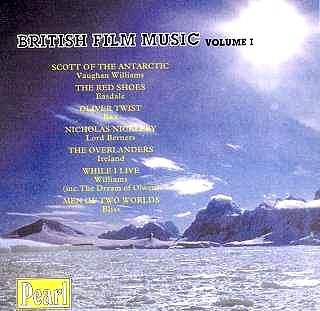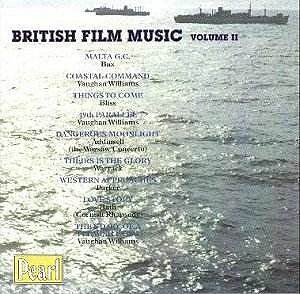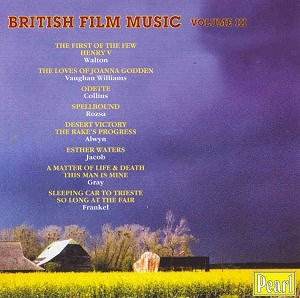Pearl's three discs, issued in quickish succession
several years ago, survey British film music from the highways
(Bax, Bliss, VW and Ireland) and the byways (Greenwood, Gray,
Jacob, Parker and Warrack).
What are we hearing? What we are not hearing
is the sound of the original soundtracks except in the case of
Dangerous Moonlight on Vol. II. Instead Pearl have harvested
from here and there both commercial and promotional 78s made usually
within months of the film's release. These 78rpm discs were made
for commercial sale and for private or promotional purposes. The
latter material falls into two categories: Rank's private 78 series
promoted the studio's film; BBC discs used to permit broadcasts
in the middle of the night to the Empire and beyond. Copies of
the BBC material were often distributed to radio stations worldwide
in the interests of promoting British music.
The recordings were made during the period 1935-50
although most are concentrated in the years 1946-48. The sound
is historic and in mono … so be warned. The worst sounding is,
perhaps not surprisingly given its soundtrack provenance, the
Warsaw Concerto played by Louis Kentner.
Easdale was much associated with the Archers
Productions (Pressburger and Powell). Here he is represented by
the music for The Red Shoes. The extended ballet and, for
that matter, the prelude, are full of exotic Gallic and Russian
hues but with an English overlay. This is the stuff that would
have incited Diaghilev to a new production with designs by Bakst
or Roerich if only Easdale's life had intersected with Diaghilev's.
The Williamson and Wilkinson tracks are nice
to have but are of the frothy costume-drama type you find in both
the Alwyn (vol.2 Chandos) and Frankel (CPO) compilations. Speaking
of Frankel, his famous music for So long at the Fair - Carriage
and Pair is as charming and subtle as ever though here with
a finish that simply peters out rather than the 'concert ending'
I thought I had heard in other recordings. As music you should
think of this in the same approachable category as Delius's La
Calinda and Eric Fogg's Sea Sheen (now there's a project
for the next ASV collection of rarities).
Frankel's Sleeping Car to Trieste is a
fine example of railway music played at full tilt with the the
pistons thrashing. Both Murder on the Orient Express (Richard
Rodney Bennett) and Pacific 231 (Honegger) start slowly.
This work cuts in at full pelt almost immediately. Railway music
buffs need to add this disc to their shelves.
As some readers may know, I am an out and out
Baxian. However all but the last two tracks of the Oliver Twist
suite from the film music are lavender water Bax and arrive
complete with effetely tinkling piano. This is effeminate stuff
rather than feminine; lady-like rather than seductive. Bax is
here too tame by half: more Springtime in Sussex and the
Faure Variations than Winter Legends and the Sixth
Symphony. Things pick up considerably in the last two tracks and
Fagin's Romp is given a virtuoso luge ride of precipitate
celerity and edge-of-seat precision. Bracket this with Golovanov's
breathlessly hurtling recording of Mendelssohn's Scherzo.
Malta GC is much darker than I had remembered and had more
of the atmosphere of prime Bax than the Twist score. The
complete Twist film music will be issued by Chandos (BBCPO
conducted by the rising star Rumon Gamba) before very long.
Vaughan Williams came late in life to film. However
he took to the medium like a proverbial duck to water. He saw
film music as part of his work for a war in which he was now too
old to serve in the Forces. He had seen active service in the
Great War (the Pastoral Symphony being redolent of his
experiences in France).
Scott of the Antarctic is a post-War film.
Its use of colour and authentic locations made quite a splash
at the time enhanced by music here transferred from a double-sided
Plum label 78. This is well enough known now but hearing the ingenious
use of a panoply of 'spiels and 'phones and the haunting deployment
of vocalisation by solo soprano (Margaret Ritchie) this reinforces
the evidence that some composers feel greater freedom to experiment
in the cinema rather than in the concert hall.
Coastal Command and Flemish Farm are
taken from BBC broadcast transcription discs. Coastal Command
tends to blandness in the rum-ti-tum Prelude but improves
with the section depicting the flying boat closing with the German
raider. A much fuller suite, digitally recorded, is encountered
on a Cloud Nine (now ASV Whiteline) CD of British film music.
The Dawn Scene from The Story of a
Flemish Farm, with its prominent role for solo violin, is
poignantly done and is all the more affecting for the later doom-laden
climax, prophetic of the plot which involves sacrifice and death
in Nazi-occupied Belgium. Unused 'chips' from this score found
their way into the Sixth Symphony. Hearing it again now
it is surprisingly Delian. The year previously (1942) the
composer had celebrated his seventieth birthday. Amongst the tribute
pieces commissioned by the BBC was Constant Lambert's Aubade
Héroïque.
The Prelude from 49th Parallel is quite
another matter. This, with its wide-ranging epic theme, ascends
the same lyrical heights as his best concert music of the 1940s.
The Joanna Godden scenes are presented in two groups each
with a single track of about four and a half minutes. In general
this music is soft and unemphatic. Scenes such as Martin drowned
at Dungeness (a touch of RVW’s opera Riders to the Sea?)
and Burning of the sheep have more grit and atmosphere.
Several times I thought the music was more in keeping with the
threatening Dickensian mists of another marshland - the desolation
in which Pip encounters Magwitch.
Something similar to this series has been done
once before though nothing like so extensively. In the very early
1990s EMI Classics briefly had CDGO 2059 in its catalogue
paCked to to the gunwhales with film music extracts and superbly
documented. Of course this was an isolated CD and inevitably a
less inclusive presentation - one disc as against Pearl's three.
The EMI disc rather bucked the trend by anthologising British
film music from the less obvious corners. It had the advantage
of having access to sound documents closer to the source than
those generally accessible to Pearl.
Pearl have cut their sound archive 'cake' from
various angles. Not all that long ago I reviewed Pearl's issue
of the first Boult recording of Vaughan Williams' Sixth Symphony.
All the RVW film music tracks on these three discs were added
to that CD as fillers.
The Bliss Things to Come tracks on volume
II are fascinating and make the disc an essential purchase for
Bliss enthusiasts. These Decca tracks were set down in 1936, a
year after the launch of the film. The film did moderately well
on both sides of the Atlantic but Bliss's music easily outstripped
popularity at the cinema. Decca issued four sides of original
music and two sides dubbed from the film conducted by Muir Mathieson.
Bliss had recorded four other sides and these are included
here having been discovered by Jonathan Dobson among Sir Henry
Wood's papers deposited at the RAM. These recovered sides are
The Prologue (tr.1), the March (tr.3) and two discs
making up the Epilogue (tr.7). The Baraza track
on Vol. I sounds better on the Dutton CD that also includes Bliss
conducting the Colour Symphony.
The Warrack march (Theirs is the Glory)
is jaunty and, unlike Alwyn's very decent Desert Victory march,
rather forgettable. The Alwyn suffers from some high end damage
by contrast with the superb audio quality of the Waltz
from Sleeping Car to Trieste - like poignant ballet music.
The Alwyn Calypso is a decidedly sleepy calypso but soon
picks up the Caipira-like motoric energy found in the Sleeping
Car music. Parker's Western Approaches - Seascape
is another matter altogether - a splendid evocation of dawn at
sea, flurries of ice-cold spray, all grimly heroic. Speaking of
which we come to Collins' music for Odette which in addition
to the foreboding also gives us a sedate waltz - a memory of happier
times in the life of Odette Churchill. It is conducted by Charles
Williams. Bath's Love Story has the darling of the concert
hall and Bax's lover, Harriet Cohen, at the piano for the Cornish
Rhapsody - a subset of the Warsaw Concerto. Charles
Williams' Dream of Olwen (from the 1947 While I Live)
is played by another master of British light music (look him up
on his newly established website). This is delightful if caramel
sweet stuff but packs a slender yet memorable clout.
Psychological scores such as Spellbound
must also include the masterful Powell and Pressburger fantasy
A Matter of Life and Death, music by Allan Gray
superbly carried off by Charles Williams’ conducting the Queen's
Hall Light Orchestra on Columbia. The Gray music for This Man
is Mine oozes facile charm but fades almost as soon as it
is heard.
I seem to recall reading some uncomplimentary
stories about Spoliansky's role in the industry. His 1946 music
for Wanted for Murder is played by Eric Harrison (piano)
with the Queen's Hall Orchestra conducted by Charles Williams.
Tense atmosphere but forgettable out of filmic context. John Greenwood's
choppy Waltz into Jig is impudently flashy. Gordon Jacob's
boisterous and well-constructed music for the film adaptation
of George Moore's novel Esther Waters is taken from a Rank
Film promotional 78 as are the Alwyn Sleeping Car, Lambert
Williamson and Arthur Wilkinson tracks. Williamson is commercially
suave in his two tracks from the music for Woman Hater (1948)
with Dinner at Lady Datchett's indebted to Prokofiev's
Romeo and Juliet score. The Wilkinson tracks are smooth
and agreeably facile - commercial with no aspirations or achievements
beyond the illustrative and transient moment. Berners' Nickleby
score while well polished is pretty much in the same category.
It can also be heard on a Symposium CD that also includes the
Unicorn-Kanchana collection of Berners' songs and piano solos.
The commission for Ireland's music for The
Overlanders was lucrative but its production cost the composer
dear. Neither Ireland nor his friend Bax took to the drudgery
of film music with the duck-to-water aptitude of Vaughan Williams,
Alwyn or Frankel. Still the eight or so minutes of music with
its brusque heartlessness makes it one of the monuments of British
film music. There are some pastoral moments as well (tr. 13, 4.24).
The notes are by Roger Thomas and they give us
the essentials. Typos are few and far between - in fact I found
only one: It is not Clifford Parker but Clifton Parker. Perhaps
someone was confusing the composer of the music for Western
Approaches with Hubert Clifford who also wrote film music
as well as a single and quite filmic Symphony (the latter recorded
on Chandos).
For anyone wanting to experience the closest
approach to the authentic sound of British film music from its
first golden era these three CDs are indispensable. The coverage
is wide-ranging and generous.
Rob Barnett


